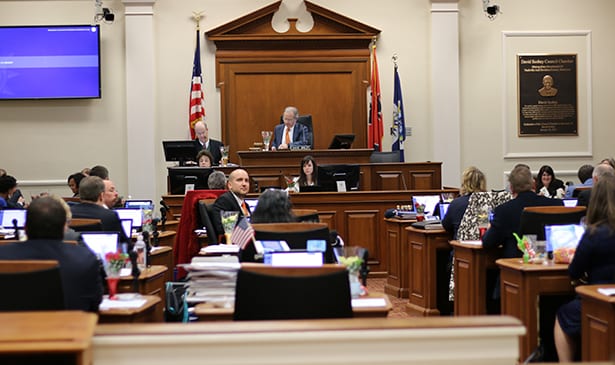By Peter White
NASHVILLE, TN — Citizen activists are doing better with bills they’ve put in front of the city council. Wearing t-shirts and carrying signs, members of the People’s Alliance for Transit, Housing, and Employment (PATHE) and Stand Up Nashville crammed the City Council chambers two weeks ago.
“I’m here for the transit and the Do Better Bill. Having been in the trenches on the ground in the community like I have, clearly I see that all these concerns are very much intersectional,” said veteran organizer Jackie Sims.
Sims advocates for working people. She said she wants the city to build a pipeline for people to get jobs that pay a living wage with the kind of training needed so people can take care of their families.

The Do Better Bill would require companies that get grants from the city to disclose information about wages, safety violations, and hiring practices or face losing those incentives by a council vote. The Nashville Chamber of Commerce is against it.
“We want there to be community benefit agreements,” said Sims. A CBA is a contract that requires a company doing business with the city to do certain things. It could be contributions to the Mayor’s new land trust for affordable housing, or providing new buses, or hiring city residents.
“We want the council to pay close attention to all these companies–who they are, who they are hiring, and how they are treating them so that Nashville can be a better place for families,” she said.
Sims was in a Rules Committee meeting Tuesday, December 12, about a bill to establish a Citizens Oversight Board (COB) of Metro Police.
Sims and others from Community Oversight Now are working with District 5 Councilman Scott Davis. The bill passed its first council reading in November and will come up again in January.
The advocates are creating a 17-member task force to bring all sides into discussion of the controversial bill that faces opposition from the Chief of Police Steve Anderson, the Fraternal Order of Police, and several council members. Mayor Barry said she wants stakeholders to weigh in and hammer out a bill that the council will support. As written now, it is doubtful the COB bill would pass.
Sims has had better luck with the Airport Authority and it’s $1.2 billion expansion plan. Sims said the authority has added a workforce development component to their Request for Proposals. That means apprenticeship programs for jobseekers.
“We asked them to pay attention to the six Promise Zones, so those that are trying to secure contracts with the Airport Authority, we want them to look at the people who need a pathway up out of poverty so they can prosper as the city prospers.”
Community groups like PATHE continue to put pressure on the Mayor’s $5.2 billion transit proposal that unanimously passed its first of three readings last month. There will likely be a citywide referendum vote on the transit plan in May 2018.
The flurry of activity at year’s end comes after months of organizing for affordable housing, expanded bus service, higher wages, and things like a COB and marks a change in how Nashville community groups are engaging their elected officials. They are becoming more sophisticated and carrying their causes into committee meetings and arguing for change in the halls of government.
It turns out they have allies there.
I am excited about all the people who came out tonight,” said At Large Councilwoman Erica Gilmore. She urged council members to support the Do Better Bill.
“When the citizens of Nashville work with the legislators of Nashville, work with the Mayor’s office, work with the different departments, we can get things done,” she said.
“One of things I am really really interested with this bill is the focus on training and apprenticeship programs,” said District 6 Councilman Brett Withers. Withers represents residents of Cayce Homes where the MDHA is introducing mixed income housing to help lower the poverty rate in his district.
Sekou Franklin, an organizer with Community Oversight Now, said there is a dedicated cadre of savvy young activists who are driving political change in the “It” city.
“There’s a deeper level of analysis going on with these groups that speaks to an understanding of organizing for the long haul,” said Franklin.


